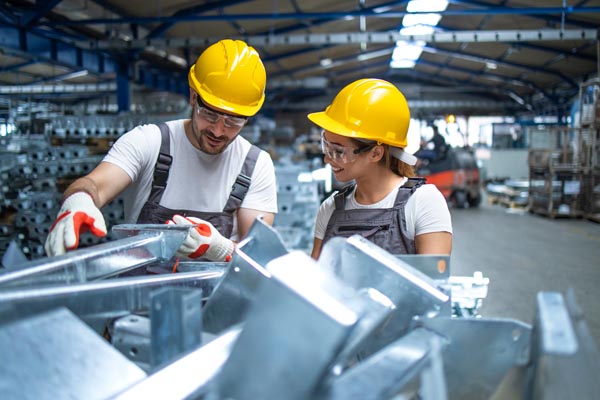Production line workers are part of the foundation of the Canadian economy. These workers make up a vital part of the manufacturing industry, a core economic sector employing 1.7 million people in a wide range of industries across the country. Manufacturing is responsible for a considerable part of the country’s economic output, drives growth, and is predicted to expand in the coming years.
Production line workers work on different parts of assembly lines, where several workers come together to build different products. Usually, each production line produces a single product, so production workers become specialized in particular products or industries. The work is challenging and fast-paced and can make for a rewarding career for the right person.
Line workers might use tools or machinery or simply their hands to make different parts of a product. These workers will eventually assemble the parts to complete the final product, whether it be an aircraft engine or a children’s toy. Individuals might work as fabricators, who make pieces of a product, or as assemblers, who put together the pieces to create the outcome.
Technological Advances
Manufacturing has proved itself to be a leader in technology. Even on the assembly line, robotics, 3D printing, and other technological assets are regularly employed, with these innovations shaping and changing the global manufacturing industry.
These innovative technologies have also redefined the skills that a production worker might need or want to develop. While entry-level production jobs require no technical training (you must be 18 years of age and legally eligible to work in Canada), higher-up positions require specific specialized capacities.
Some essential skills for production workers looking to reach a higher pay grade might include: using hand tools or heavy machinery, assembling parts, conducting quality and safety checks, and/or reading and understanding schematic diagrams.
Safety First
One of the skills listed above may seem benign, but it is one of the most essential in manufacturing. Creating and maintaining a safe working environment is a core part of production work and will make it possible to have a long and successful manufacturing career.
Production work can be exhausting – requiring long hours of standing or other physically demanding work. By the end of a long shift, workers might be tired and apt to make mistakes if they don’t follow safety protocols. Workers are required to use safety equipment, such as head, ear, and eye protection, so they don’t get hurt in the case of an accident. The most successful production workers are in good physical condition and respect safety regulations, even when tired.
Some production lines require that new hires show at least a year of experience in a comparable job or can prove in another way that they will not have trouble spending an entire shift on their feet, can lift at least 50 lbs., and can follow detailed instructions without fail. Candidates who have already operated tools or machinery will stand out amongst applicants. However, these and other skills can be taught to the right person.
As mentioned above, technology is a driving force in the manufacturing industry, so workers who have experience with programmable robots, computer systems, or motion-control devices (as they are used in the assembly process) will also have a leg up over the competition and could easily be hired for advanced assembly positions or other higher-paid work.

Degree Not Required
Working on a production line does not require a degree. However, most employers ask that their new hires hold at least a high school diploma or equivalent. Management will provide any further training upon hiring. However, those with previous experience, additional degrees, or training could potentially start at higher pay grades or have shortened formal training periods.
There is an exception when it comes to specialized positions, which might require an associate degree or formal training courses. This is often true when the final product on the production line is a motor vehicle, aircraft, or electronic equipment.
Employers might also offer apprenticeship programs for production workers interested in career growth. These apprenticeship programs provide training for higher-skilled assembly jobs from inside the company. This is especially beneficial as each production line requires different skills, so training for a specific production line can be very specialized.
Certifications
Certification is an excellent way for production workers to improve their skills and get higher-paying jobs. Certifications aren’t always required but are highly recommended in more technical fields that involve complex tasks, such as welding or pipefitting. A list of certification options is given below:
Certified Production Technician. The Certified Production Technician course is designed to prepare production workers for the challenges of maintaining high-quality production. This course covers safety, quality practices, measurement, manufacturing processes, and an introduction to maintenance procedures.
Certified Automation Professional. This certification demonstrates that the automation professional has a deep understanding of automation and related controls, which is necessary to be an effective professional in this field. The International Society of Automation issues this certification.
Good Manufacturing Practices Facility Certification. The Center for Professional Innovation and Education offers this certification, demonstrating that the recipient thoroughly understands manufacturing guidelines in biological, biopharmaceutical, or pharmaceutical subjects.
Certified IPC Specialist. This certification demonstrates that the recipient follows industry standards for electronics manufacturing. This course has modules in soldering, hardware installation, terminal connections, and through-hole technology. The Institute of Printed Circuits offers two different certification levels- CIS and CIT. It is globally recognized and is valid for two years.









